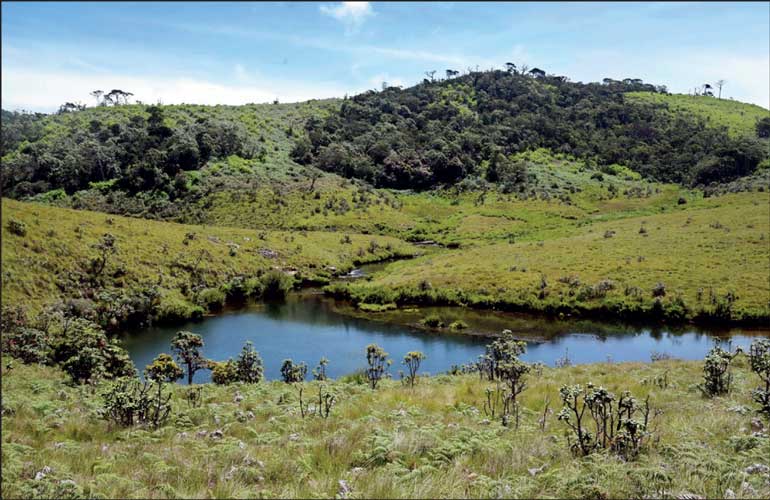Tuesday Feb 17, 2026
Tuesday Feb 17, 2026
Saturday, 18 November 2023 00:02 - - {{hitsCtrl.values.hits}}
 Horton Plains hiking trails
Horton Plains hiking trails
This comment complimented the basic fact highlighted by the two academics that all solutions to put right a world suffering from pollution and man-made destruction of the earth would be to turn to nature. The growth of plant species on mountain slopes was underscored to prevent landslides, quoting examples from Nepal, on the importance of mangroves to cool the overheated earth, noting that Sri Lanka has lost its way from its initial enthusiasm for nurturing mangroves for climate disaster prevention following the 2004 tsunami
 Climate change are two words bandied about quite often but the seriousness of it which is linked to the very survival of the human species is often lost on us, the global education system focusing very little on what every child should learn about nature and how we are entwined in it.
Climate change are two words bandied about quite often but the seriousness of it which is linked to the very survival of the human species is often lost on us, the global education system focusing very little on what every child should learn about nature and how we are entwined in it.
The Wildlife and Nature Protection Society of Sri Lanka organised a public lecture last Thursday that filled a vacuum on climate change education enlightening how nature could be harnessed using much of nature based on common sense and ancient knowledge.
Delivering the talk on ‘Harnessing nature for climate change action’ Dr. Sriyanie Miththapala and Prof. Devaka Weerakoon traced the enormous threats to all living beings faced by climate change due to human action. Pointing out that climate change has increased vastly in the past century, the joint presentations by the two conservationists showed how climate change attacks the entire ecosystem just as a malfunction in one area of the human ecosystem, the body would impact the whole.
Dr. SriyanieMiththapala is a graduate in Biology from the University of Colombo, with an MA in Biology from Smith College, US, and PhD in Wildlife and Range Sciences from the University of Florida, US. As a Smithsonian Research Associate, she is a consultant at the Sri Lanka Country Office of the International Union for the Conservation of Nature (IUCN).
Prof. Devaka Weerakoon is a senior professor at the University of Colombo, Department of Zoology and Environment Sciences, and has worked extensively on local and international conservation projects.
Pointing out the need for a holistic policy on climate change action that would incorporate nature based solutions the two conservationists showed how using shrubs, grass and trees is far superior to a stone made wall when countering flooding.
Among the points highlighted at the discussion that ensued with the participants, was that nature based solutions ‘take time’ to which they said it should be dispensed with, given the concept of ‘time’ should be interpreted in accordance with the sustainability and impact of the solution. The explanation that two or three years would take for some plant species to become an effective buffer against landslides should not be regarded as a ‘long time’ said a member of the audience who actively works on interweaving nature based solutions with various other socio-economic concerns.
This comment complimented the basic fact highlighted by the two academics that all solutions to put right a world suffering from pollution and man-made destruction of the earth would be to turn to nature. The growth of plant species on mountain slopes was underscored to prevent landslides, quoting examples from Nepal, on the importance of mangroves to cool the overheated earth, noting that Sri Lanka has lost its way from its initial enthusiasm for nurturing mangroves for climate disaster prevention following the 2004 tsunami. Examples from Bangladesh showed the effectiveness of the floating plots created using traditional knowledge to counter flooding. Here, reed mats were weaved interwoven with plant seeds and roots so that it would stem the excessive outflow of water, resulting in aesthetic floating gardens.
It was demonstrated that conserving nature and the survival of other species finally lead to the survival and wellbeing of humans, indicating that conservation equals food security and the opposite equals loss of homes, livelihood, poverty and food insecurity.
They explained how nature grows forests on its own when left to its own devices, with human assistance could result in more food security.
“I hope a holistic national policy, one policy that would integrate all essential factors related to climate action and conservation would be made in my lifetime instead of fragmented solutions,’ quipped Dr. Miththapala, when asked her views on the different policies made in Sri Lanka pertaining to theses connected with nature conservation.
Although not elaborated upon due to time constraint, how animals, including leopards, contribute to the ecosystem was briefly touched on.
Here again the logic that was self-evident is that when nature is conserved and kept in abundance for the animal species their encroaching on human territory decreases. Sri Lanka’s dilemma is that the human occupied landmass is some 70% with less than 30% safeguarded for nature.
The lecture focused on global and local economic impacts of climate disasters running into billions of dollars while the corrective path seems quite simple; return to nature and let nature take over our lives and minds instead of flagrant materialism.
One of the highlights of the event in terms of audience participation was when well-known forest garden promoter Ranjit Seneviratne 87 years young jumped up from his seat and yelled ‘I am 87 years and I can jump like this because I eat everything that grows in my garden forest in Kollupitiya.’ It is so simple. A forest can be grown even in a concrete obsessed territory and one such home garden forest can be an inspiration to many.
While congratulating the incredible efforts of those such as Dr. Sriyanie Miththapala and Prof. Dewaka Weerakoon the impact of such lectures are so powerful, and at times unmeasurable. For instance, chatting with Ranjit Seneviratne after the event I learnt that it was one of Dr. Miththapala’s lectures some 10 years ago that inspired him to transform his home garden into a forest. (SV)